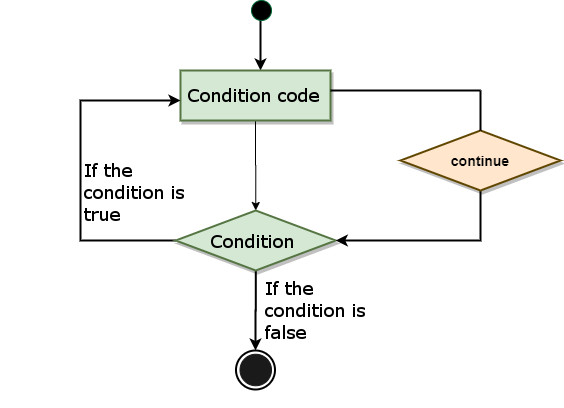The
continue
statement in the
Go
language is a bit like the
break
statement. But
continue
instead of jumping out of the loop, skip the current loop to execute the next loop statement.
In
for
loop, execute
continue
statement triggers
for
executionof incremental statements.
In multiple loops, you can use labels In variables The execution result of the above example is: The following example has multiple loops that demonstrate the difference between using tags and not using tags: The execution result of the above example is:
label
mark one’s mind
continue
cycle. 2.27.1. Grammar #
continue
syntax format is as follows:continue;
continue
statement flow chart is as follows:
2.27.2. Example #
a
equal to
15
skip this loop and execute the next loop:Example #
package main
import "fmt"
func main() {
/* Define local variables */
var a int = 10
/* For loop */
for a < 20 {
if a == 15 {
/* Skip this loop */
a = a + 1;
continue;
}
fmt.Printf("The value of a is: %d\\n", a);
a++;
}
}
The value of a is: 10
The value of a is: 11
The value of a is: 12
The value of a is: 13
The value of a is: 14
The value of a is: 16
The value of a is: 17
The value of a is: 18
The value of a is: 19
Example #
package main
import "fmt"
func main() {
// Do not use tags
fmt.Println("---- continue ---- ")
for i := 1; i <= 3; i++ {
fmt.Printf("i: %d\\n", i)
for i2 := 11; i2 <= 13; i2++ {
fmt.Printf("i2: %d\\n", i2)
continue
}
}
// Using tags
fmt.Println("---- continue label ----")
re:
for i := 1; i <= 3; i++ {
fmt.Printf("i: %d\\n", i)
for i2 := 11; i2 <= 13; i2++ {
fmt.Printf("i2: %d\\n", i2)
continue re
}
}
}
---- continue ----
i: 1
i2: 11
i2: 12
i2: 13
i: 2
i2: 11
i2: 12
i2: 13
i: 3
i2: 11
i2: 12
i2: 13
---- continue label ----
i: 1
i2: 11
i: 2
i2: 11
i: 3
i2: 11